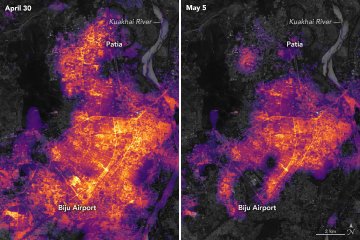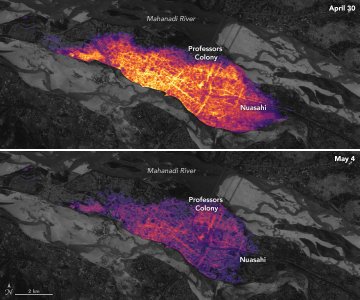
The images show city lighting on April 30 (before the storm) and on May 5, 2019, two days after Fani made landfall. (Photo: Twitter/Nasa)
Earlier this month, severe cyclonic storm Fani or the 'Hood of Snake' tore through the state of Odisha in eastern India, becoming of the worst storms to hit the country since 1999.
The cyclone brought winds of more than 200 kmph when it made landfall in Odisha on May 3. The storm caused several deaths and rendered millions of people homeless in the cities of Puri, Bhubaneswar, Cuttack, and Khurda.
The cyclone left a trail of devastation in large parts of coastal Odisha, with the seaside areas being the worst hit.
Cyclone Fani also had far reaching impact on the city's energy infrastructure and buildings, leaving around 3.5 million households without electric power for days after the storm hit.
US space agency Nasa shared images showing where the lights went out across some of the worst affected areas in Odisha after Cyclone Fani.
The images show city lighting on April 30 (before the storm) and on May 5, 2019, two days after Fani made landfall.

The images above show power outage before and after Cyclone Fani in Bhubaneswar, the capital and largest city in Odisha.
Telecommunication lines got snapped in several parts of state capital Bhubaneswar and several other areas. Mobile towers were damaged and power supply was disconnected in many places. A Bhubaneswar report said scores of trees collapsed, blocking roads.

The images below show night time lights in Cuttack, Odisha's second largest city, which lies just north of Bhubaneswar.








No comments:
Post a Comment